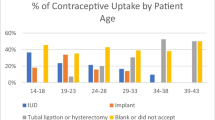Abstract
It is commonly assumed that Hispanic immigrants in the United States subscribe to a patriarchal ideology that keeps women subordinated to men, often through violence and exploitative reproductive behaviors. If this assumption is true, we might expect to find that in the Hispanic culture patriarchal males control decision-making about access to and use of birth control. Structured interviews of 100 Hispanic men and 100 Hispanic women who were recent immigrants to a Midwest community were conducted to examine this assumption. Results did not support this assumption among this study population. We found no patriarchal ideology supporting women’s subordination to men, violence as a mechanism of control, reproduction as a way of exploitation, or cultural influences discouraging access to and use of birth control in the Hispanic community. Rather, these immigrants revealed adequate knowledge of birth control use and positive perceptions of gender equality. Gaining a better understanding of the limited influence of patriarchal ideology on the use of birth control and family planning services among this Hispanic community may inform the development of family planning services tailored for new Hispanic immigrants.
Similar content being viewed by others
References
Alonso AM. Rationalizing patriarchy: gender, domestic violence, and law in Mexico. Identities: Glob Stud Cult Power. 1995;2:29–47.
Anton S. Closing the gap: patriarchy, fertility, and Latina farm-workers in South Carolina. Washington, D.C: Georgetown University, Entrecaminos, Center for Latin American Studies; 2003.
Arat Y. The patriarchal paradox: women politicians in Turkey. London and Toronto: Associated University Presses; 1989.
Berk ML, Schur CL, Chavez LR, Frankel M. Health care use among undocumented Latino immigrants. Health Aff. 2000;19:51–64.
Blea I. U.S. Chicanas and Latinas Within a Global Context: Women of Color at the Fourth World Women’s Conference. London: Praeger; 1997.
Brito A. Costumbres sexuales y cambio de valores. 2000. Retrieved May 4, 2009, from http://www.jornada.unam.mx/2000/03/07/ls-valores.html.
Coltrane S. Family man: fatherhood, housework and gender equality. New York: Oxford University Press; 1996.
Delphy C, Leonard D. Familiar exploitation: a new analysis of marriage in contemporary western societies. Cambridge: Polity Press; 1992.
Fernea R. Gender, sexuality and patriarchy in modern Egypt. Critique: Crit Middle Eastern Stud. 2003;12:141–53.
Firestone S. The dialectic of sex: the case for feminist revolution. New York: Morrow; 1970.
Forrest JD, Frost J. The family planning attitudes and experiences of low income women. Fam Plann Perspect. 1996;28:246–77.
Garcia A. Narratives of Mexican American women: emergent identities of the second generation. Walnut Creek, CA: AltaMira Press; 2003.
Goldberg S. Why men rule: a theory of male dominance. Chicago: Open Court Publishing Company; 1993.
Gonzalez-Lopez G. Fathering Latina sexualities: Mexican men and the virginity of their daughters. J Marriage Fam. 2004;66:1118–30.
Haj-Yahia MM. Beliefs about wife beating among Arab men from Israel: the influence of their patriarchal ideology. J Fam Violence. 2003;18:193–206.
Henshaw SK. Unintended pregnancy in the United States. Fam Plann Perspect. 1998;30:24–9. 46.
Lindsay R. Suffering patriarchy: an analytical exploration into the promise of the forbidden planet. New York: University Press; 1999.
Mananzan MJ. Feminine socialization: Women as victims and collaborators. Concilium: Int J Theol. 1994;1:44–52.
Pew Hispanic Center. Statistical portrait of hispanics in the United States, 2006. Washington, D.C.: Pew Hispanic Center; 2008. Retrieved February 12, 2009 from http://pewhispanic.org/factsheets/factsheet.php?FactsheetID=35.
Sable MR, Campbell JD, Schwartz LR, Brandt J, Dannerbeck A. Male Hispanic immigrants talk about family planning. J Health Care Poor Underserved. 2006;17:136–49.
Soler H, Quadagno D, Sly D, Riehman K, Eberstein I, Harrison D. Relationship dynamics, ethnicity and condom use among low-income women. Fam Plann Perspect. 2000;32:82–8. 100.
Solorio R, Yu H, Brawn R, Becerra L, Gelberg L. A comparison of Hispanic and white adolescent females’ use of family planning services in California. Perspect Sex Reprod Health. 2004;36:157–61.
Therborn G. Between sex and power family in the world, 1900–2000. London: Routledge; 2004.
U.S. Census Bureau, Ethnicity and Ancestry Statistics Branch, Population Division (2004). Current Population Survey, Annual Social and Economic Supplement, 2003. Retrieved February 12, 2009 from http://www.census.gov/population/socdemo/hispanic/ASEC2004/2004CPS_tab9.1.html.
Walby S. Theorizing patriarchy. Oxford: Blackwell; 1990.
Author information
Authors and Affiliations
Corresponding author
Rights and permissions
About this article
Cite this article
Gonzalez, E.U., Sable, M.R., Campbell, J.D. et al. The Influence of Patriarchal Behavior on Birth Control Access and Use Among Recent Hispanic Immigrants. J Immigrant Minority Health 12, 551–558 (2010). https://doi.org/10.1007/s10903-009-9272-5
Published:
Issue Date:
DOI: https://doi.org/10.1007/s10903-009-9272-5




